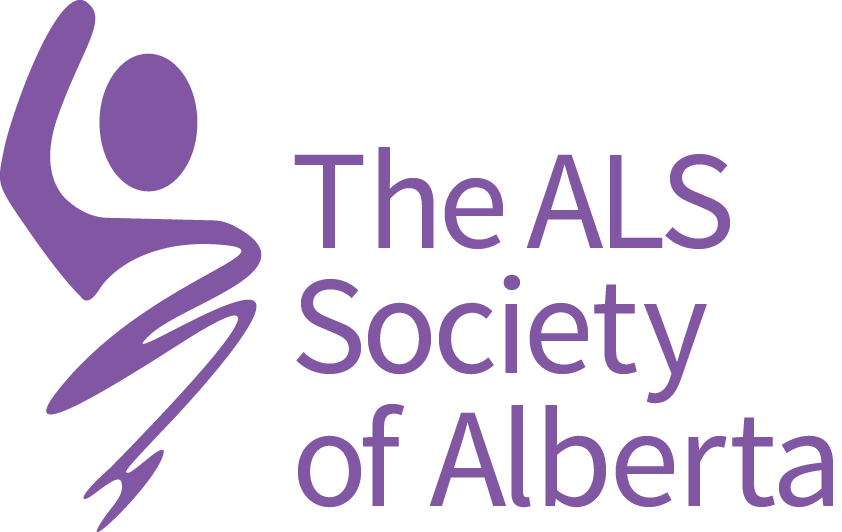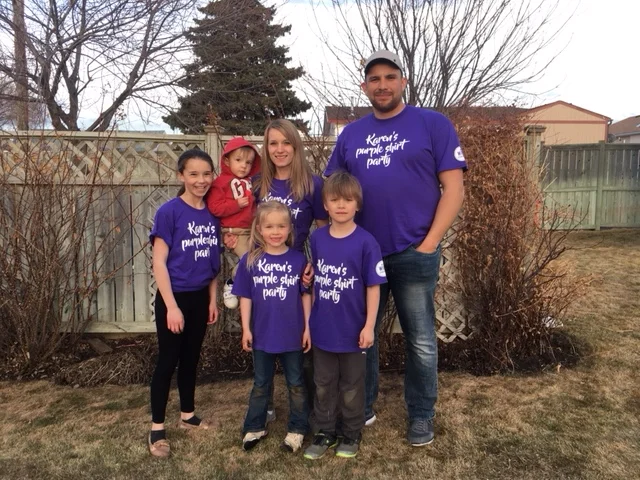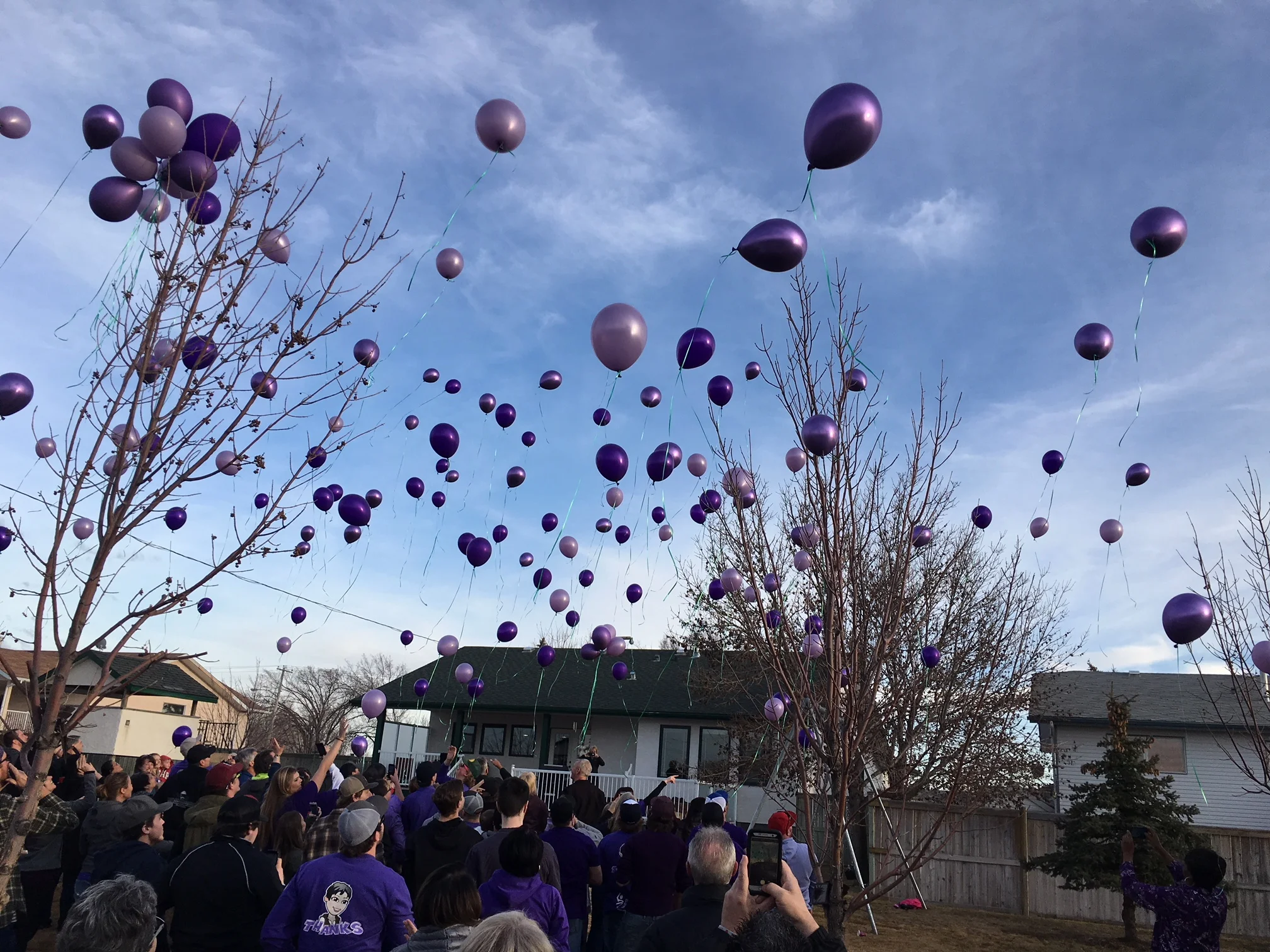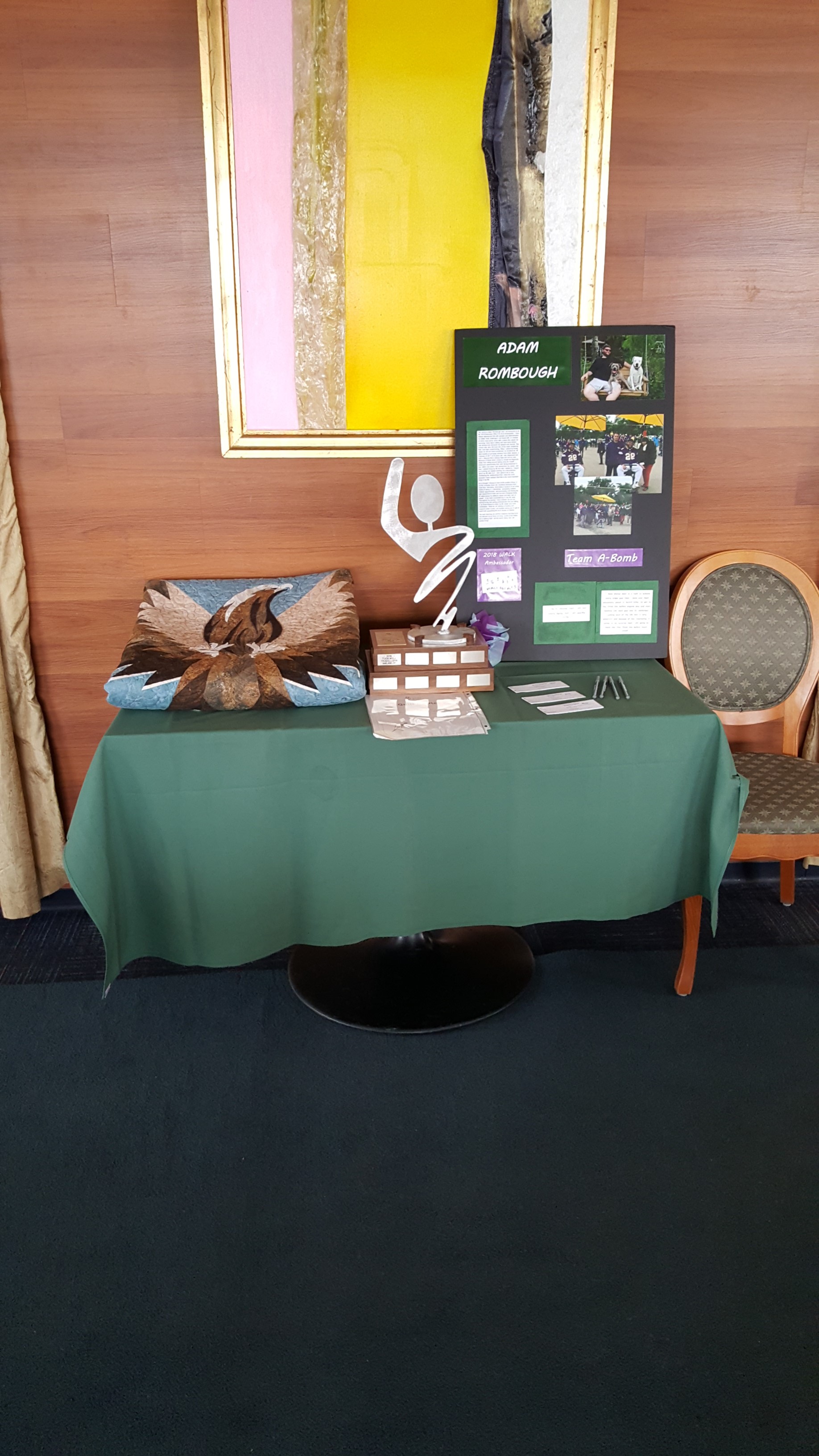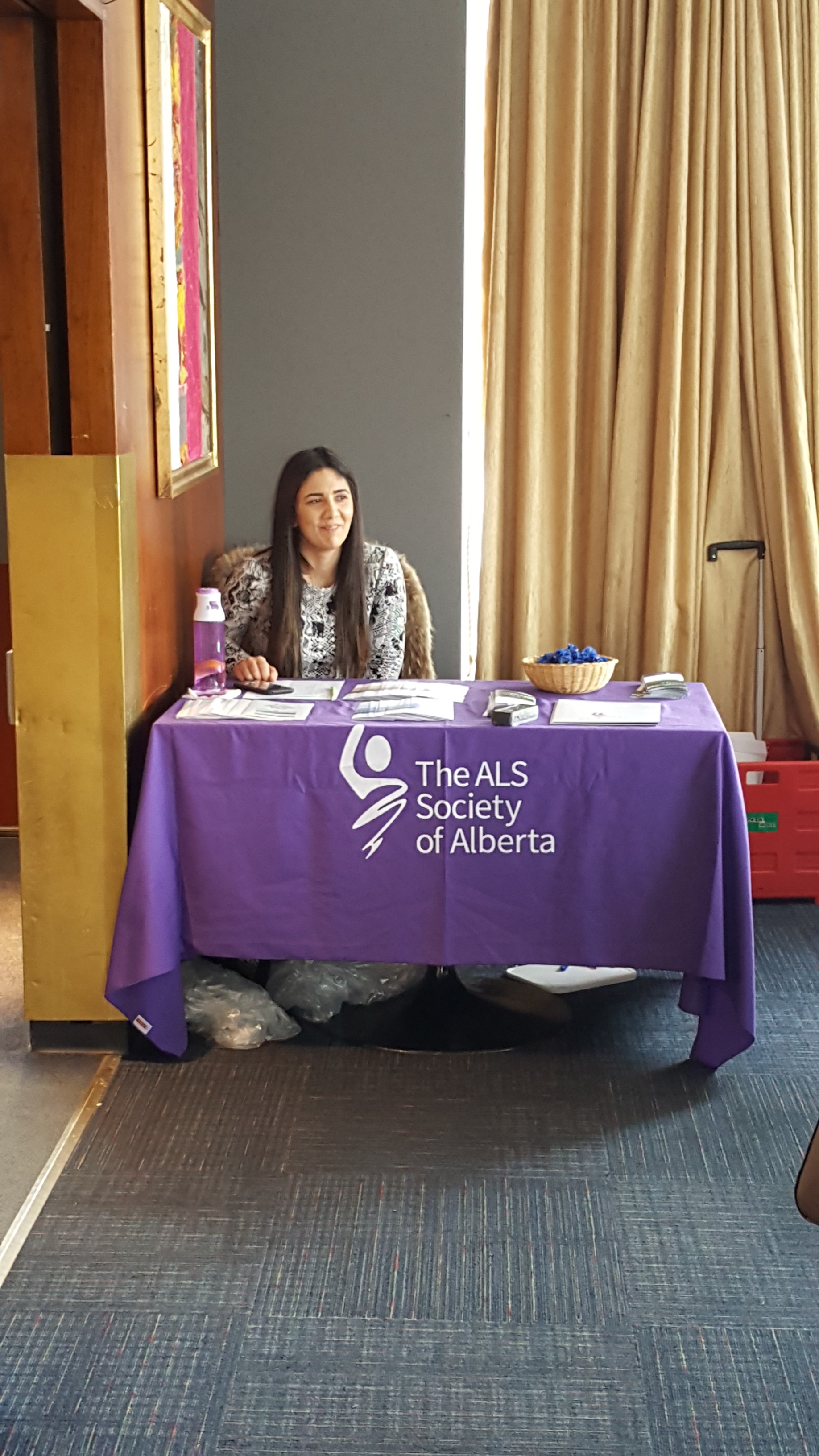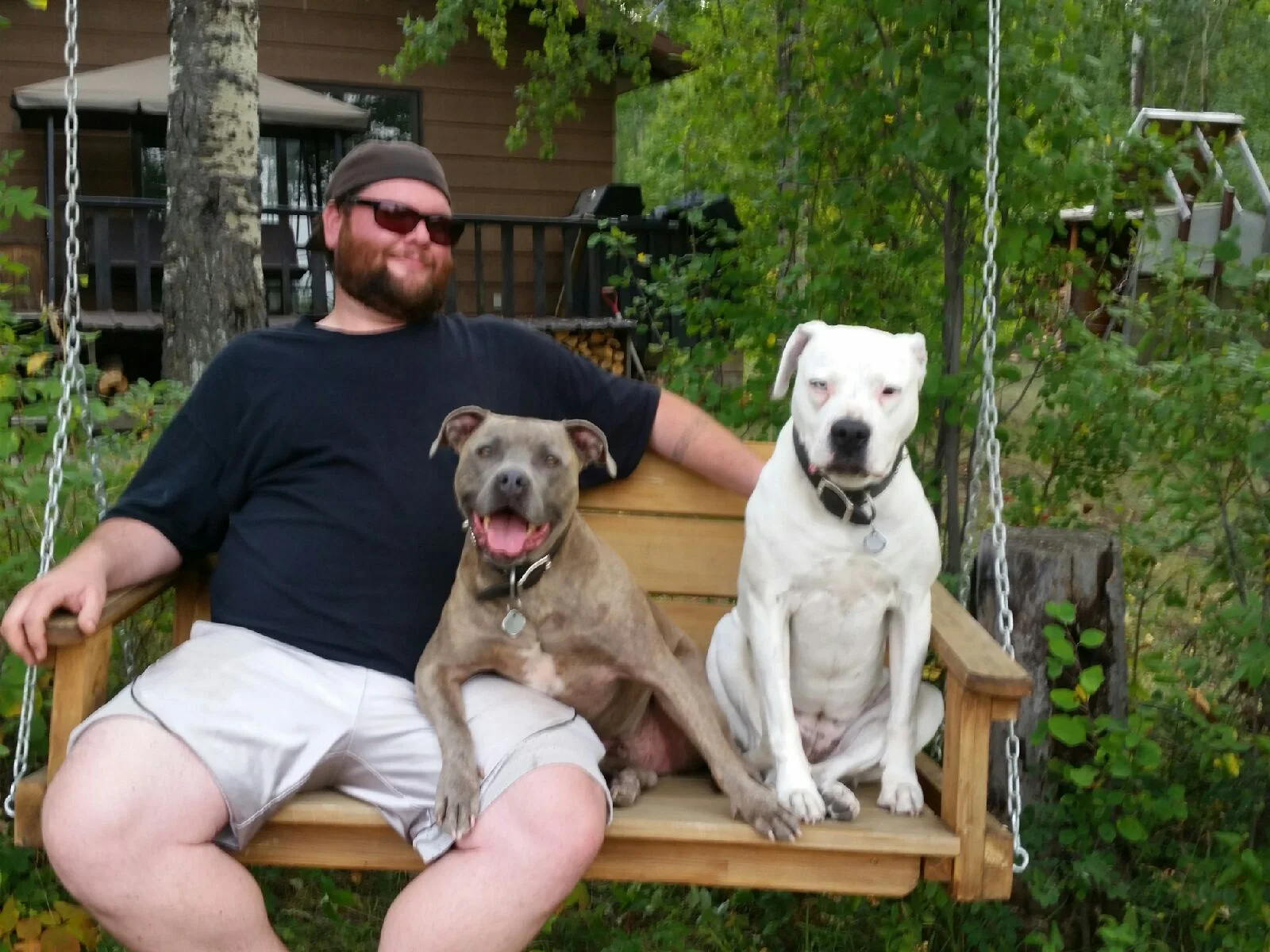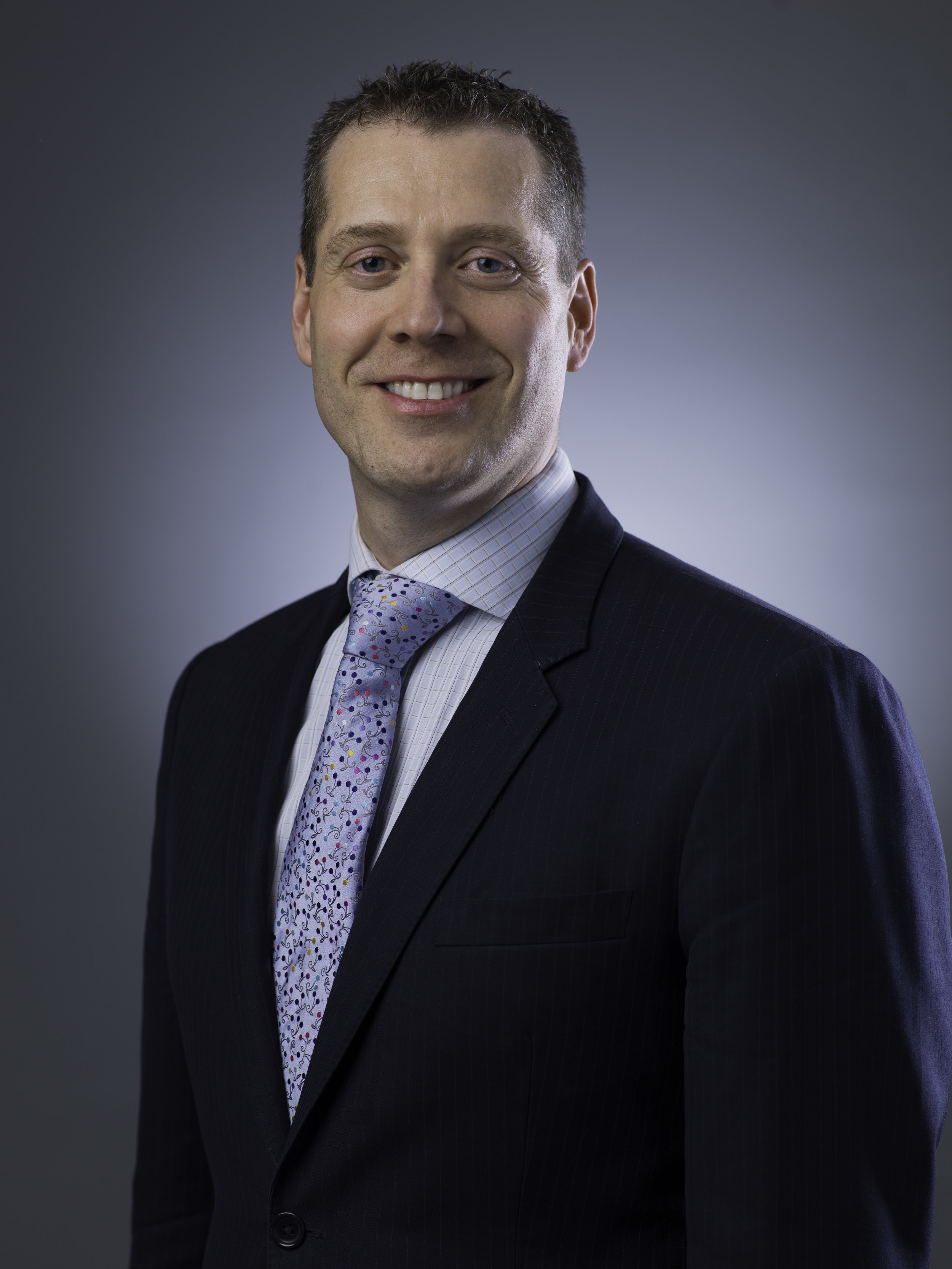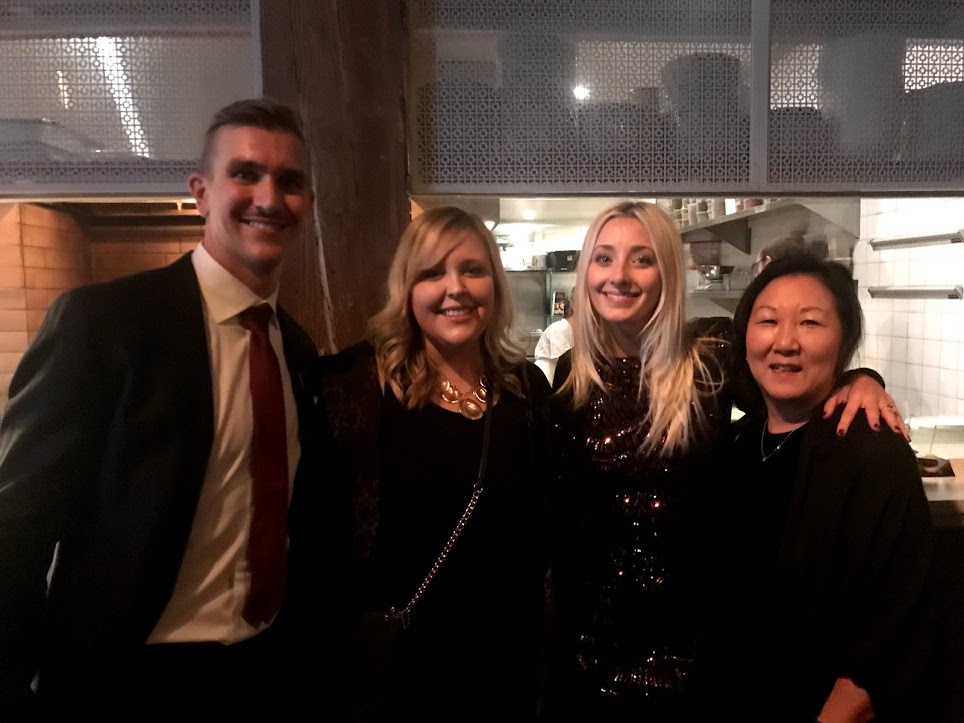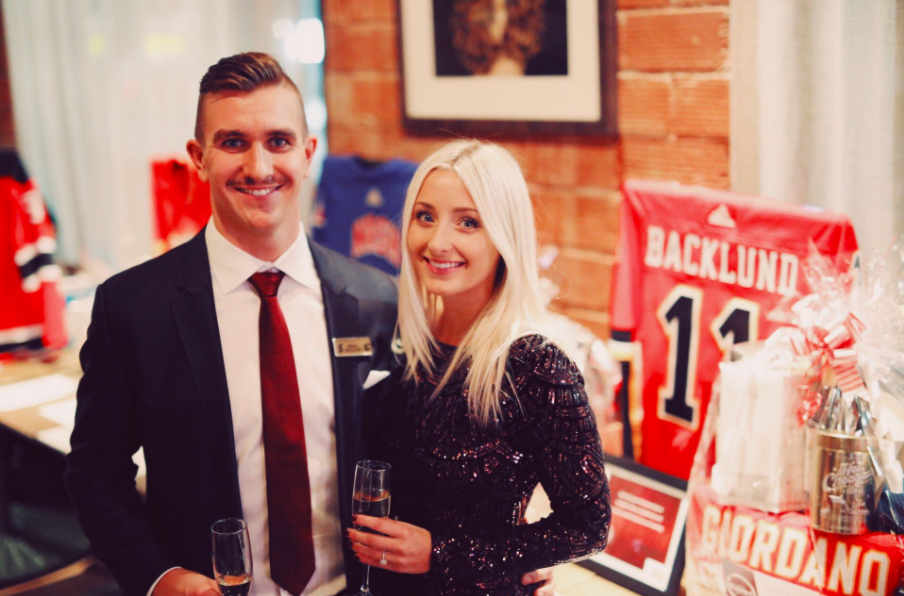The ALS Society of Alberta was thrilled to attend the 2018 national ALS research forum in Toronto from April 28-30. The progress that the research community has made is truly remarkable, with some groundbreaking research taking place in Alberta. The Society is proud to be the largest per-capita donor to the national research program and is looking forward to the continued momentum of ALS research.
Read our Spring Newsletter
Celebrating National Volunteer Week
Our volunteers play an integral role in making each day the best possible day for people living with and affected by ALS. They unselfishly donate their time to the ALS cause and help raise awareness across the province. In honour of National Volunteer Week, we would like to say thank you to each and every person who has volunteered at community fundraisers, casinos, the WALK for ALS, Betty's Run, on the Board of Directors and more. You make a direct impact in the lives of people affected by ALS.
Karen's Purple Shirt Party
We are often inspired by the commitment and unwavering support within the ALS community, but this story has truly left a mark on our hearts as we begin another week in the fight against ALS.
Saturday, April 14 marked the first annual "Karen's Purple Shirt Party" in support of the ALS Society of Alberta. After losing wife and mother, Karen Wagenaar, to ALS in 2017, Rick and his four sons brought their family and friends together to pay tribute to Karen and her journey with ALS. Rick and his family consistently mentioned how they needed to do something special in honour of Karen, and continue her legacy through annual fundraising and support of the ALS Society of Alberta. Now, they are "overwhelmed by the support in their community" and managed to raise nearly $25,000 for the ALS Society. These funds will remain in Alberta to help make each day the best possible day for people living with and affected by ALS, something that the Wagenaar family is very proud of.
We are so honoured to be a part of the Wagenaar family's incredible legacy, and to help share Karen's story with the community. We are so looking forward to everything that they accomplish as they continue to pay tribute to Karen.
2018 Edmonton WALK for ALS Pub Night
What an incredible evening at Brewsters Century Park on Saturday! We were joined by over 50 members of the ALS community, and raised nearly $2,000 for the Edmonton WALK for ALS! Thank you to everyone who attended, donated and supported this amazing event.
2018 Edmonton WALK for ALS Kick-off Brunch


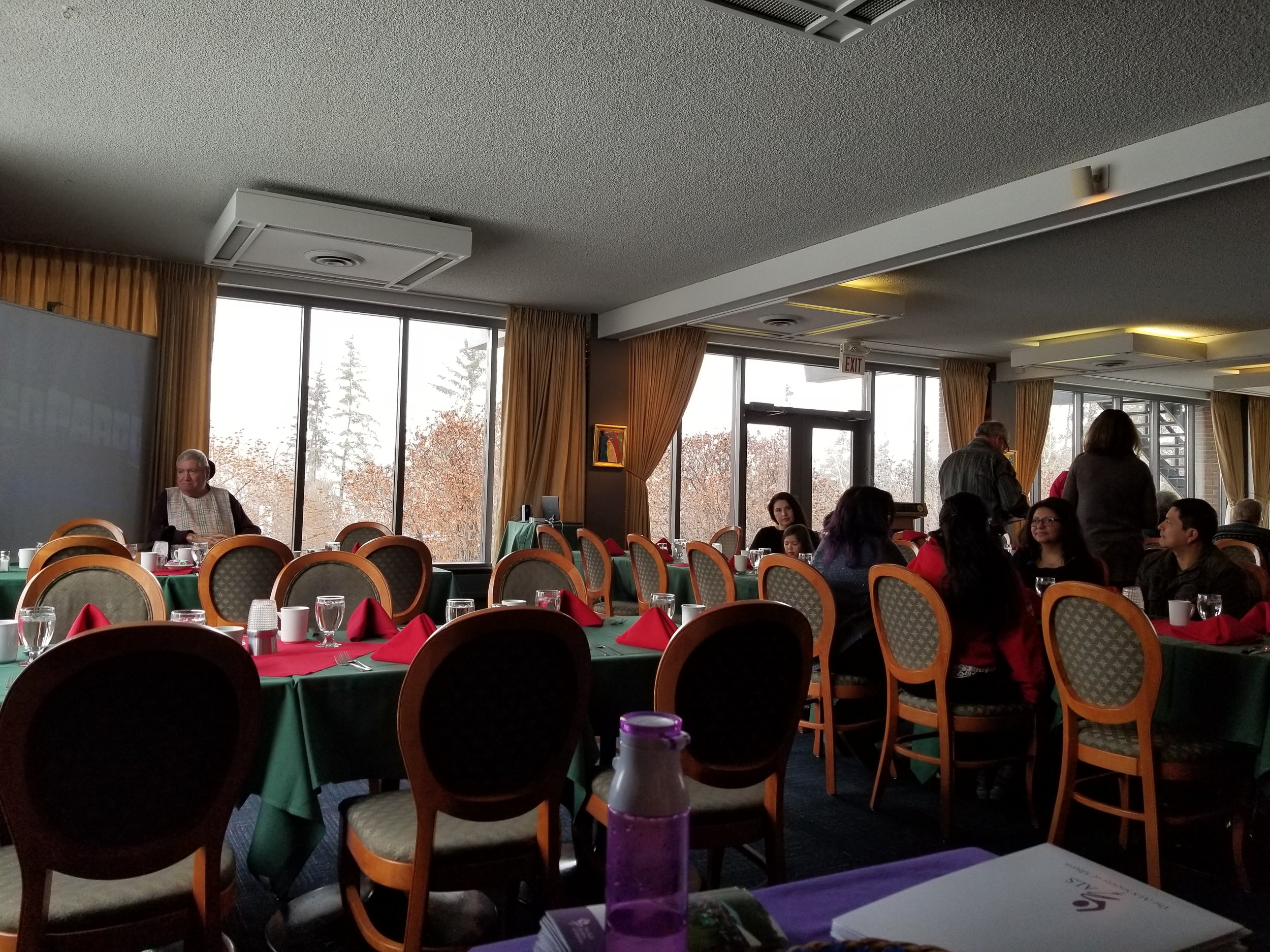
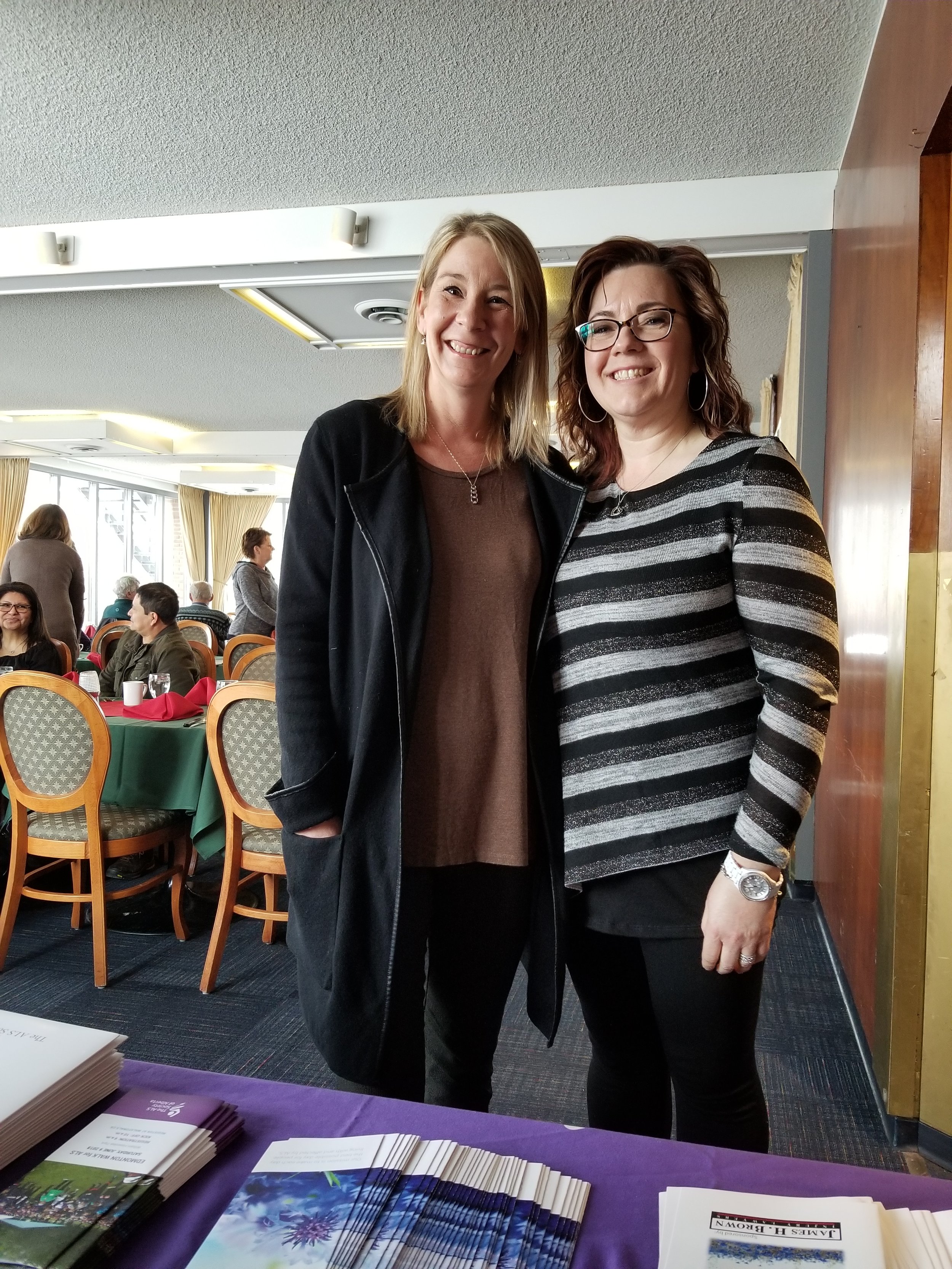

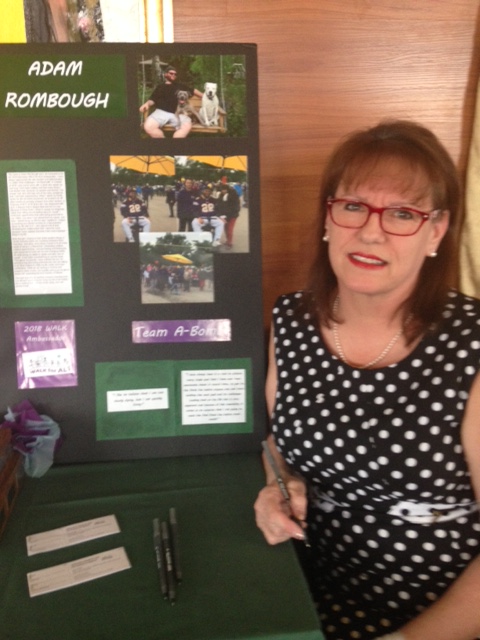
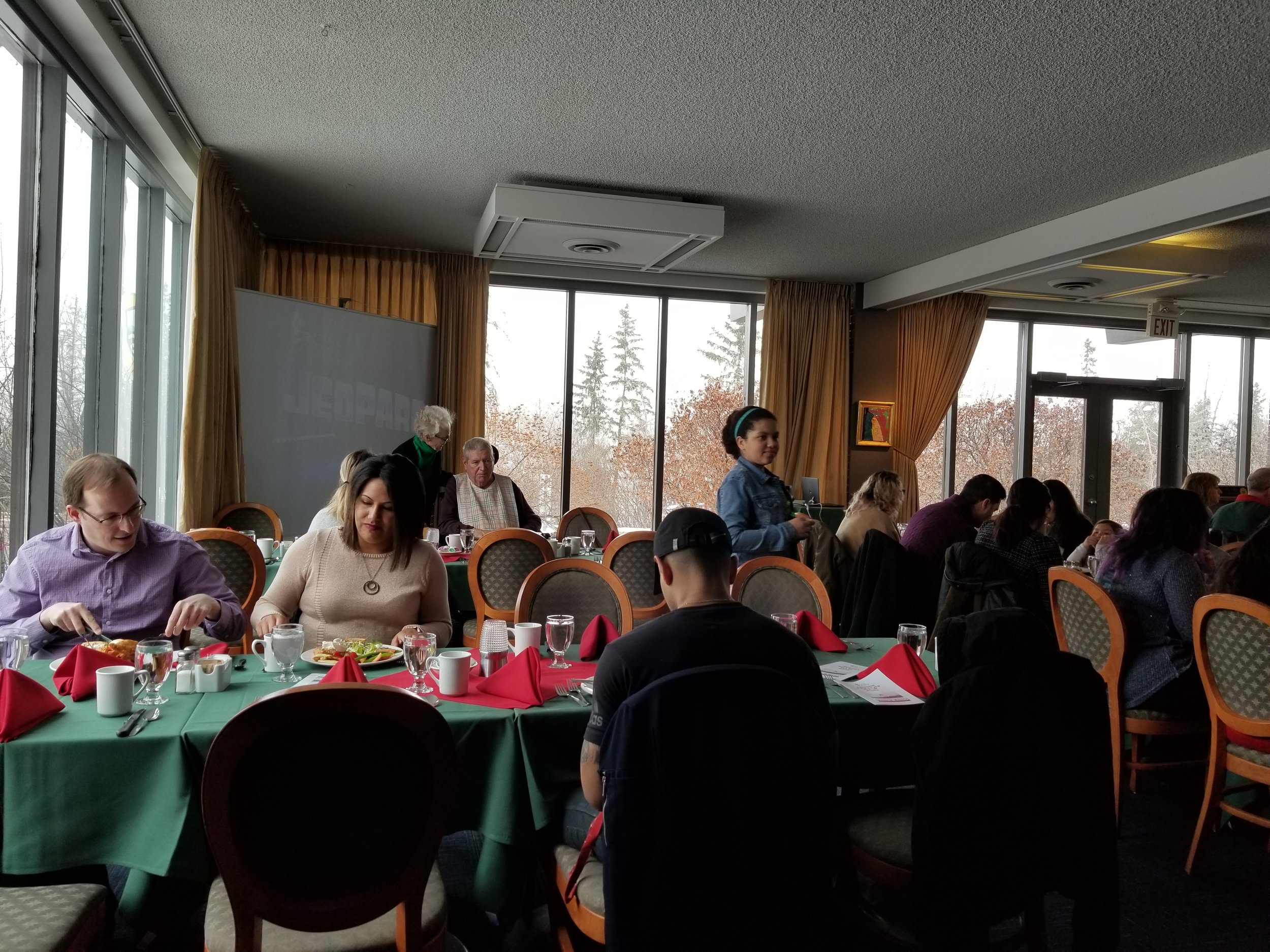
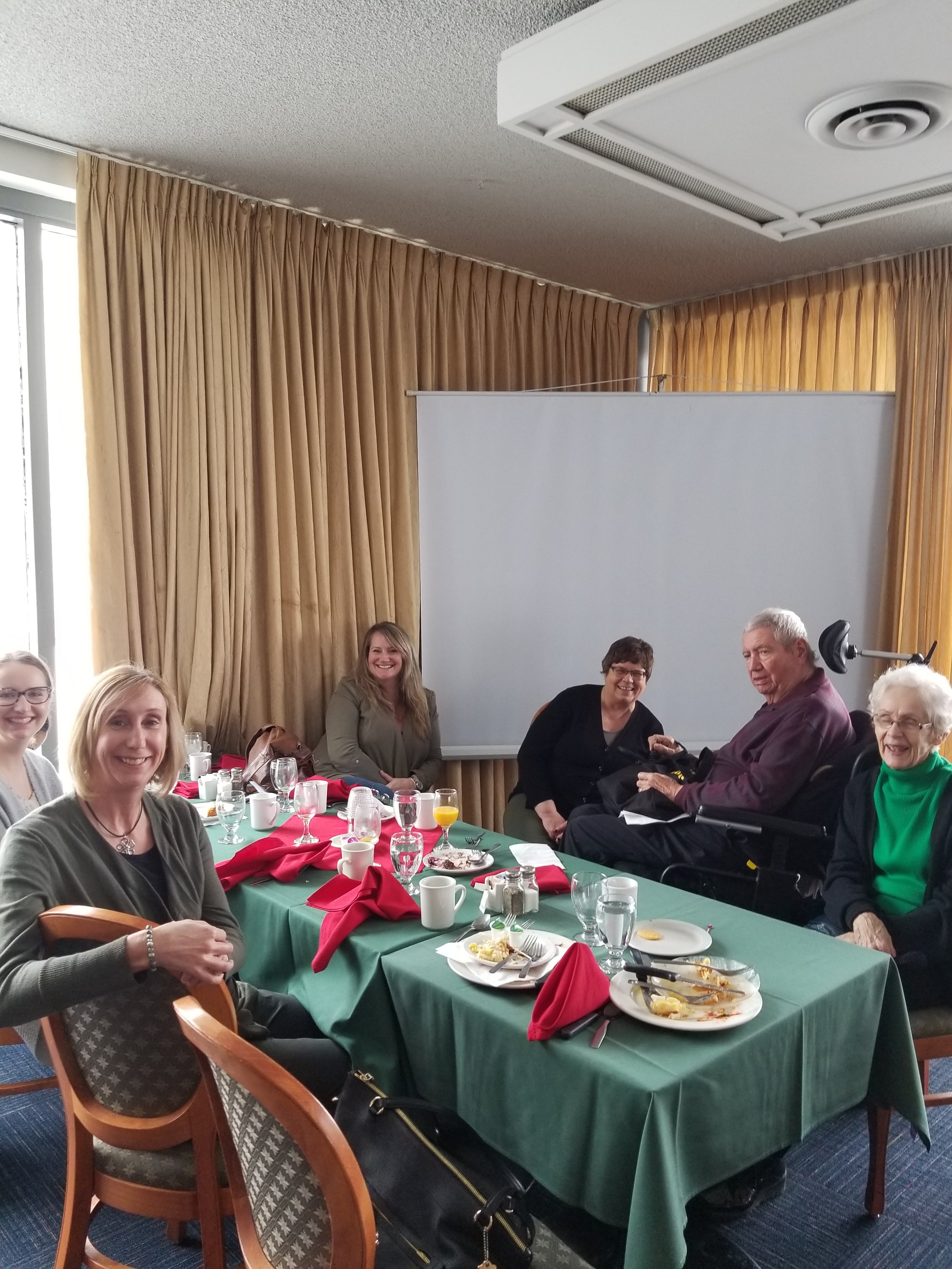
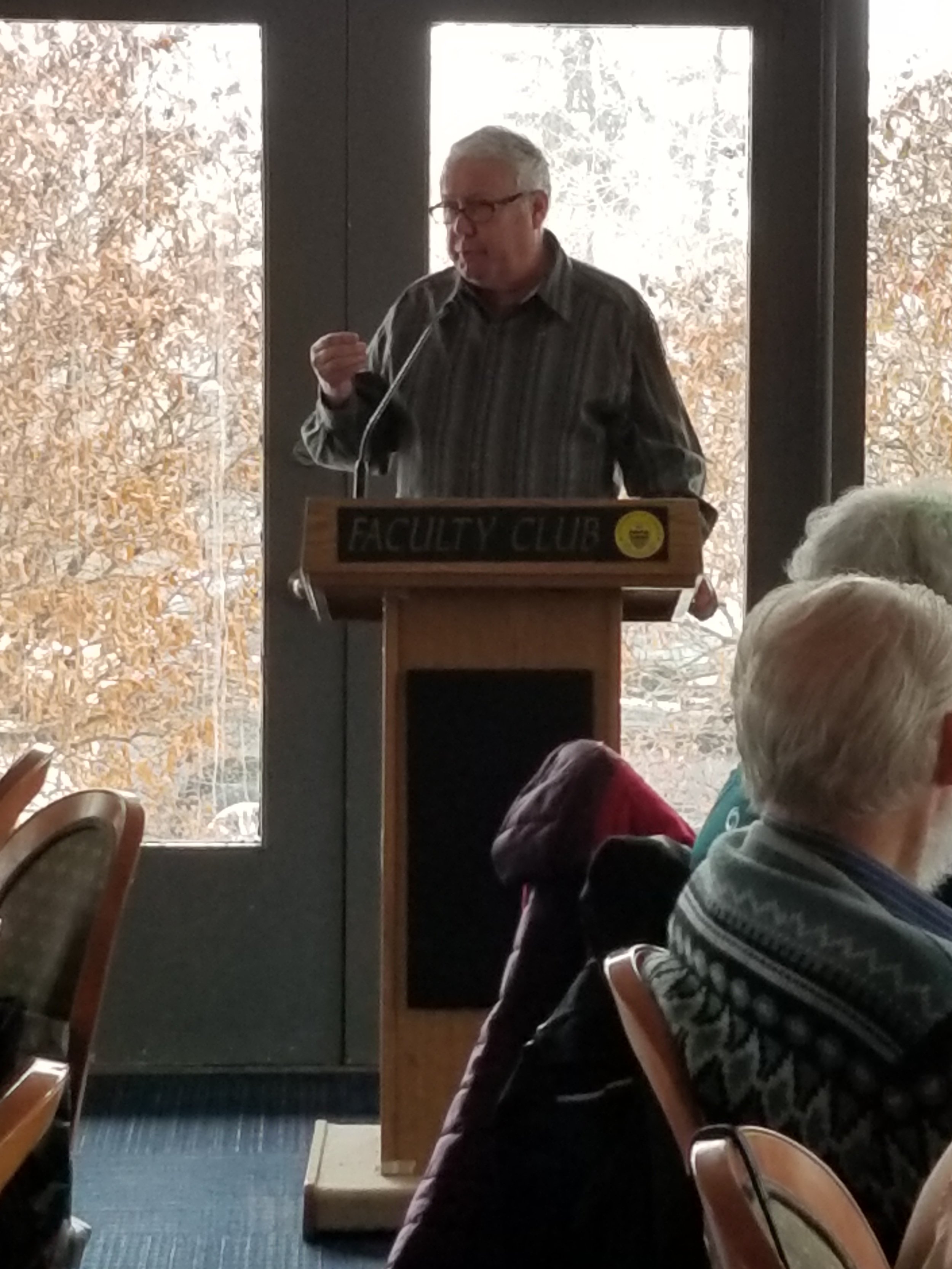
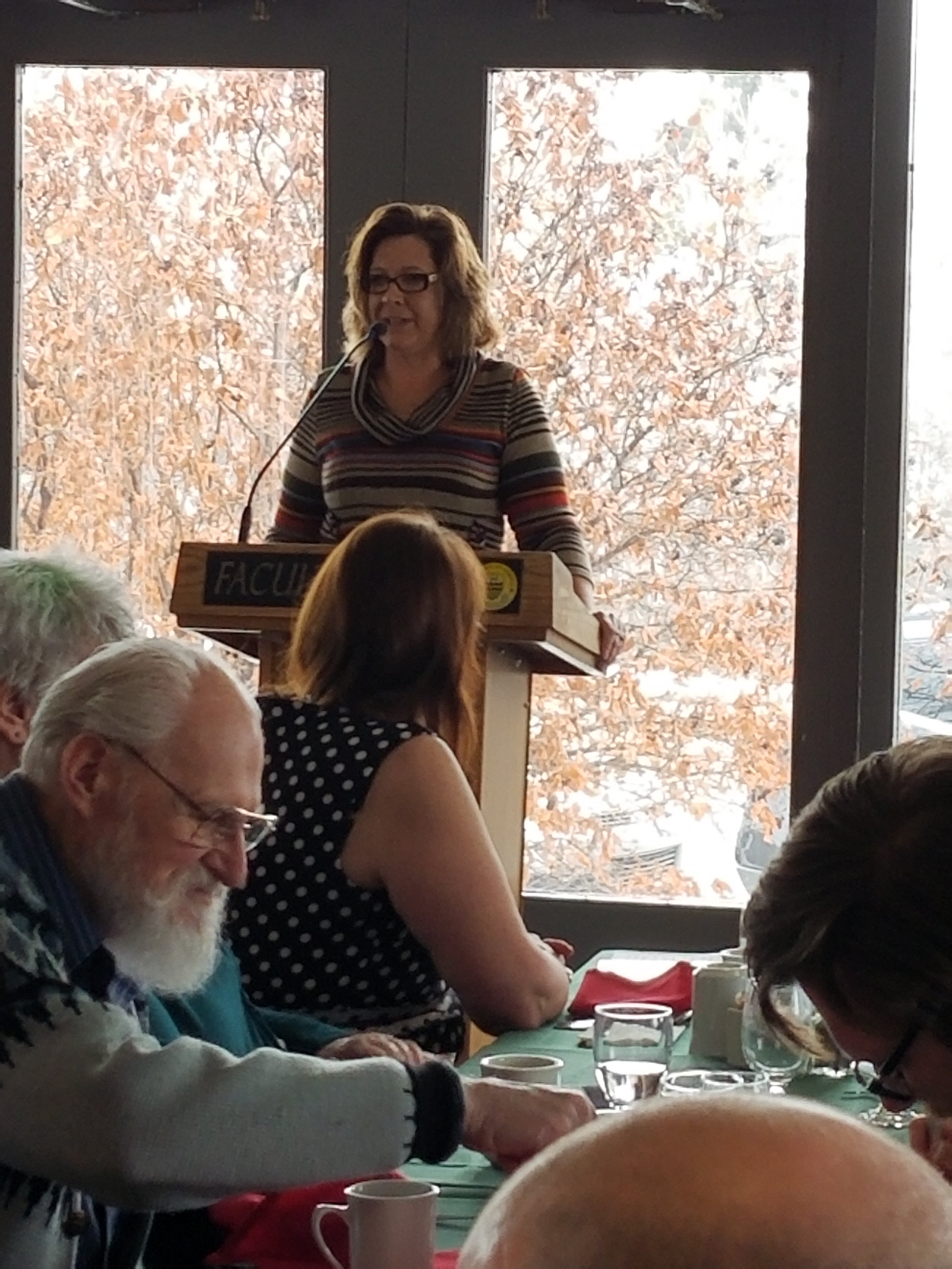
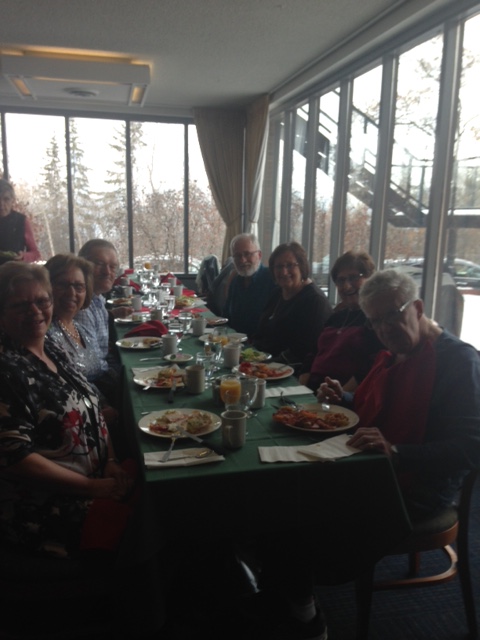
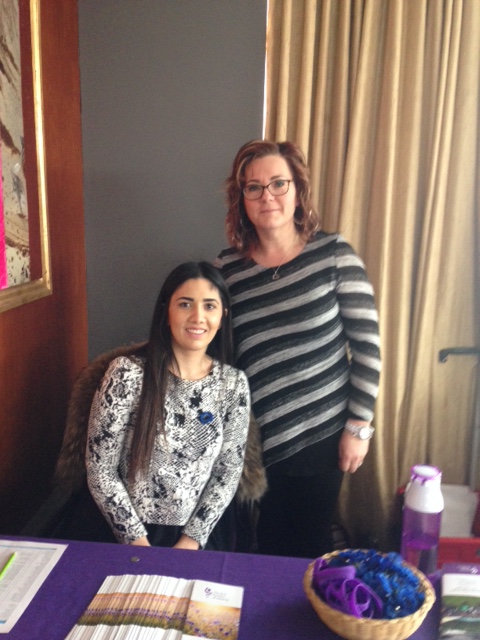
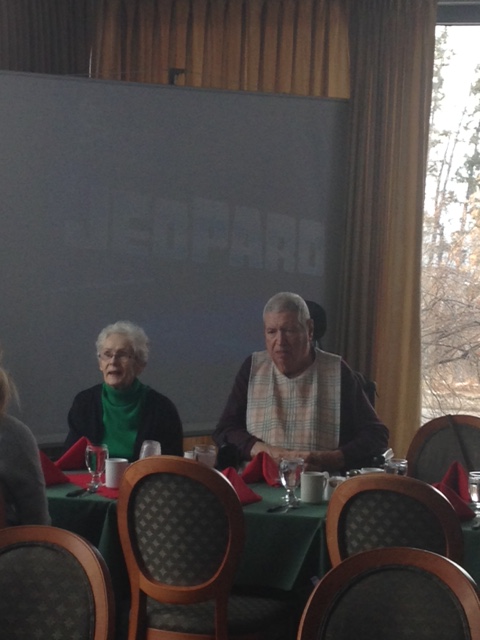
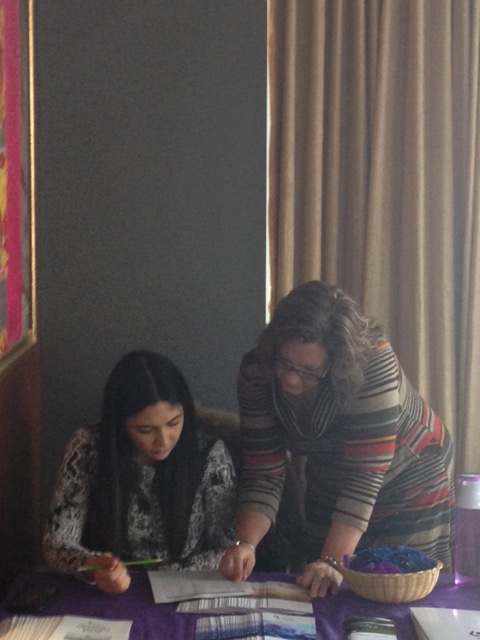
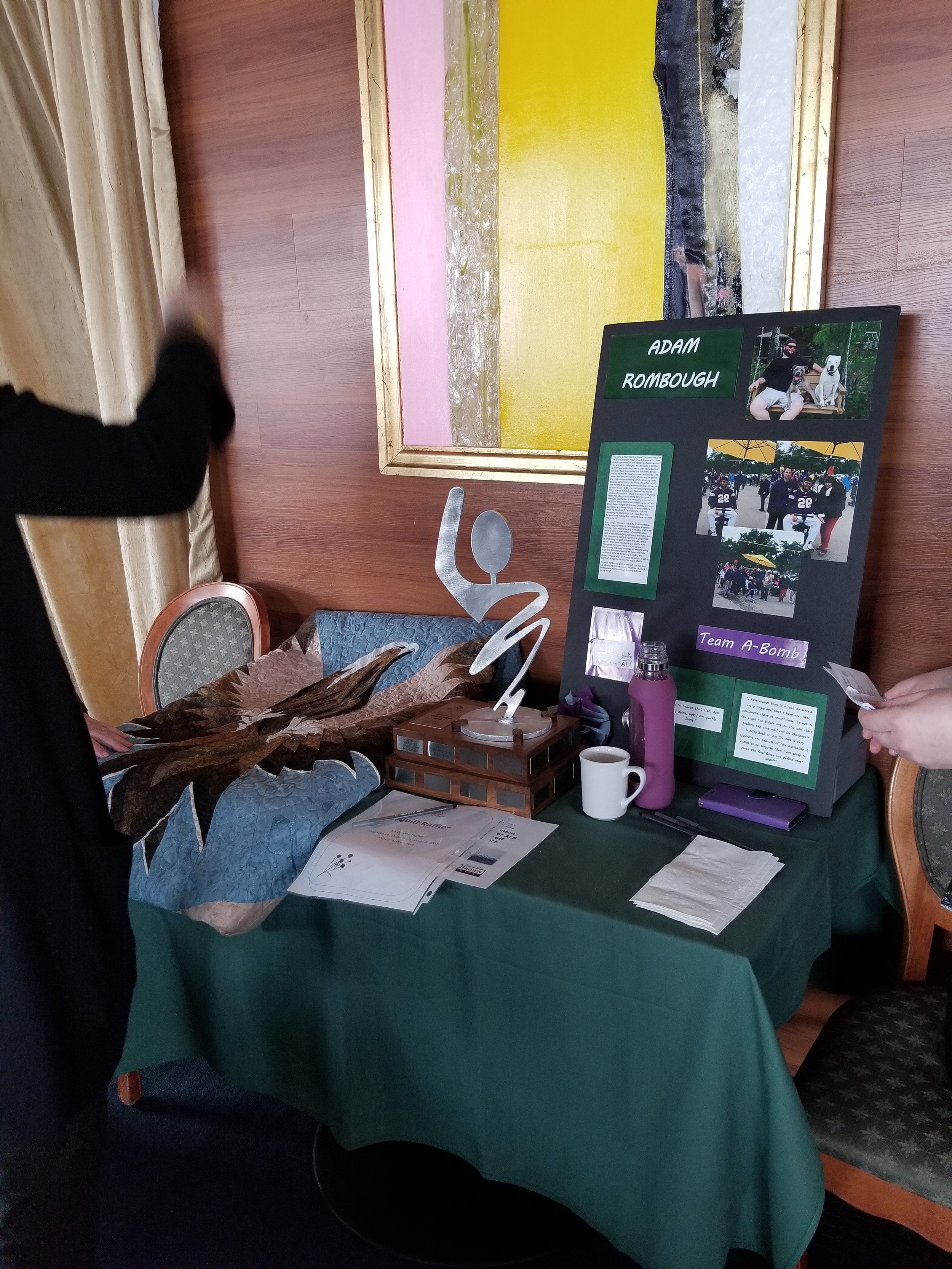
We had such an incredible morning at the Edmonton WALK for ALS Kick-off Brunch last Saturday. Over 85 people came together to get their fundraising started and to meet this year’s Ambassador, Adam Rombough. We also enjoyed some friendly-competition with our ALS Society of Alberta themed Jeopardy game! If you would like any of the information that was shared through the game, contact Lisa@alsab.ca! Thank you to everyone who joined us, 2018 is going to be a great year!
2017 Contribution to the national ALS research program
We are proud to be the second largest donor to the national research program in Canada. Yesterday, we were honoured to present a cheque for $325,825 to Ron Foerster, Chair of the ALS Canada Board of Directors. Thank you to everyone who participated in the 2017 WALK for ALS and Betty's Run for ALS, as your contributions have helped make groundbreaking ALS research possible.
Upcoming webinar: The impact of an ice bucket
How Canadians’ generosity from the Ice Bucket Challenge is making a difference.
Please join in a free webinar presented by Dr. David Taylor, VP, Research at ALS Canada at 10 a.m. on Feb. 28. During this webinar, you can expect to learn about how funds from the Ice Bucket Challenge were invested in Canada and what the expected impact will be for ALS research. There will be an opportunity to ask questions at the end of the webinar.
Songs for Ken Returns
Songs for Ken is an annual concert-fundraiser in support of the ALS Society of Alberta. Created by John Wort Hannam, Songs for Ken brings the Alberta folk music community together for two evenings of memories, music and fun.
Tickets will be available for the Fort Macleod show soon. Click below for Calgary tickets.
Introducing the 2018 Edmonton WALK for ALS Ambassador, Adam Rombough
"My name is Adam Rombough and I am honoured to be the 2018 Edmonton WALK for ALS Ambassador. I have always approached life with passion and determination no matter what challenges I am faced with. In October of 2016 I was out for lunch with a client who asked me how long I have been waiting and how many drinks I had already had, because my speech was slurred. The answer was zero; this was one of the many symptoms that I had been experiencing. When I asked my family doctor he did not seem concerned, he brushed me off. After months of pursuing answers from other doctors, in February of 2017 at 32 years old I was diagnosed with ALS, a disease that is always fatal and has no cure. Because of these facts I chose to accept my diagnosis, rather than sitting around feeling sorry for myself. I embraced opportunities that were being presented to me. Within one week I had retired from my career, and then I started living my life the way I wanted to. I began by traveling and started working on a documentary about my life with ALS. I also spend a lot of time developing the relationships that I value the most, because I have realized that that is the most important thing in my life.
Even though I choose to look at the positive things in my life everyday there are countless obstacles that I must face: relocating, renovating a house to fit all of the needs of being in a wheelchair, scheduling endless medical appointments, and purchasing and finding the right equipment to best suit my ever-changing needs. All while losing my ability to speak and take care of myself. It has been overwhelming to say the least. Throughout my journey I have realized we are not lacking loving and caring professionals who are willing to do what it takes to make my life easier and more comfortable. What we are lacking is funding and research which is why I am humbly asking you to get on board with supporting the ALS Society of Alberta.
The work that they do and the research that they fund has allowed me to focus on living my life to the fullest. I like to believe that I am not slowly dying, but I am quickly living".
Introducing the 2018 Betty's Run for ALS Ambassador, Wayne Thomas
Each year, the Betty's Run for ALS Committee selects an Ambassador to help show the public what it is like to live with the disease. The ALS Society of Alberta is thrilled to introduce Wayne Thomas as the 2018 Betty's Run for ALS Ambassador.
"I first noticed weakness in my left foot in 2015 while running with a friend. When it persisted and worsened over the next few months, I saw a doctor who assessed it as a probable back injury. For 2016, I did all the things you would for a back issue: an MRI, acupuncture, chiropractor and physio but still it wasn’t getting better. In January 2017 with my foot becoming full-on drop-foot and it becoming difficult to walk without a leg brace, I was at a loss for answers. I went to another doctor for a second opinion and he agreed that this didn’t seem normal. He recommended I have an EMG /nerve conduction test. By May it was revealed that I had significant muscle deterioration in my lower left foot and leg. After many medical tests to rule out all other possibilities, it was determined there was a high probability I had something I had not expected – a diagnosis of slow-progressing Amyotrophic Lateral Sclerosis or ALS.
Initially, I was devastated. After the grief and shock subsided, and with the support of my wife Joanna, family and friends, I got on with facing the disease head-on. I continued to work, exercise, travel and with the help of Joanna, researched various known treatments to further slow the disease. Through an ALS forum, she discovered a drug called Radicava / Edaravone that was invented in Japan and originally targeted for stroke sufferers. With her at my side, we travelled to Japan in the fall where I spent five weeks receiving the infusions with the intent to carry on with them back home. In addition, I have signed up in Canada for other clinical trials of medications being tested to treat ALS.
I am hoping that sharing my story will help shine more light on this disease. I want everyone to know that ALS is a severely underfunded illness. The support of fundraisers such as Betty’s Run, however, have accelerated the number of promising investments being made into national ALS research. The ALS Society needs our support so that not only the patients already diagnosed are taken care of, but there continues to be additional medical advances so ultimately a cure for this horrible disease can happen in the foreseeable future. From a personal perspective, this diagnosis has been a glaring reminder for me that we all have to savour life more and live it to the fullest. I have had a great life so far, and any experience I have going forward will be counted as a blessing not a right. Supporting Betty’s Run is a great example of how we can all get involved and I am honoured to be part of it."
Another amazing evening with Mikael Backlund!
Mikael Backlund generously hosted our families at Thursday night's game. It was a night full of spectacular memories and joy. Thank you so much!
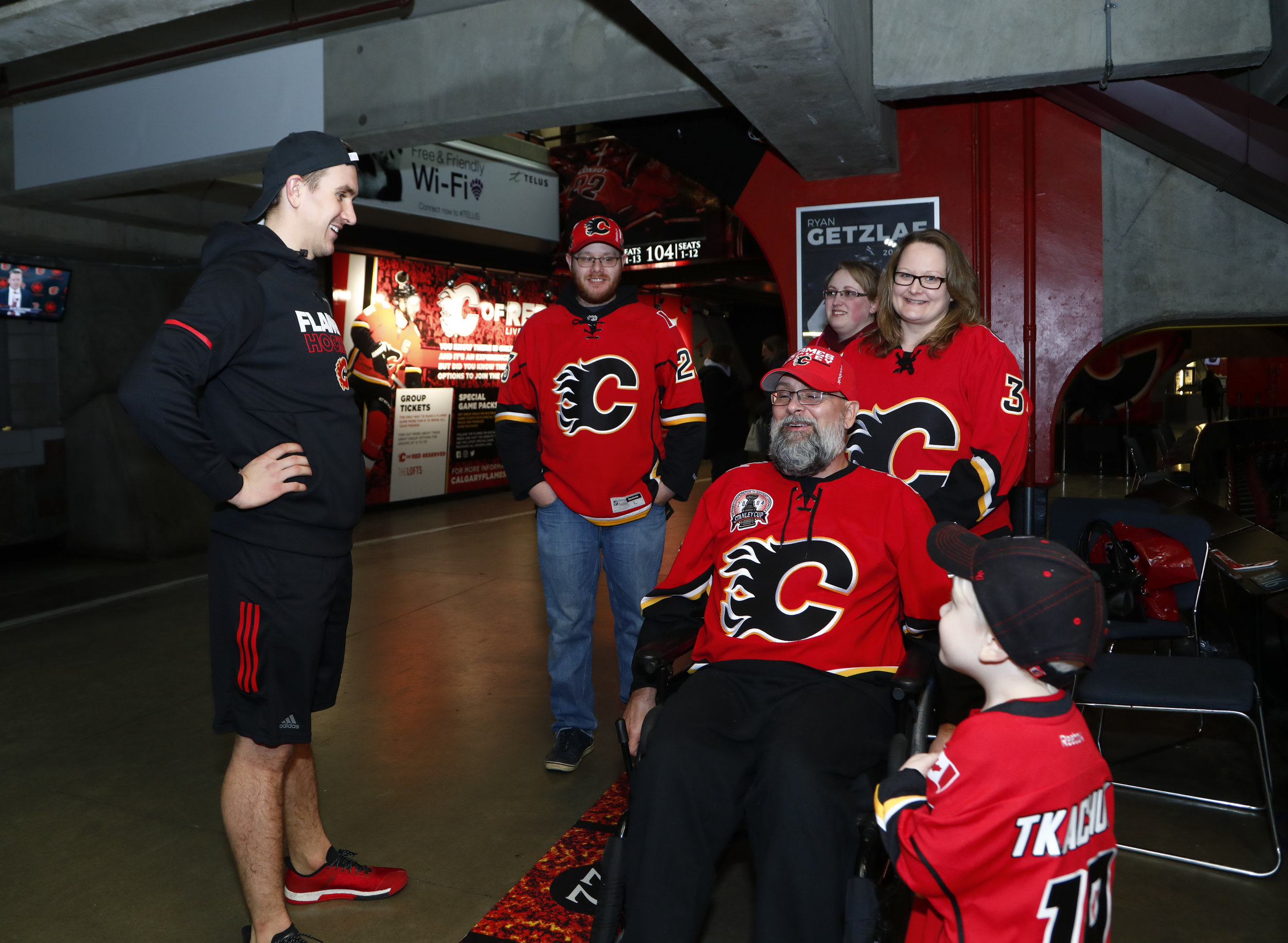
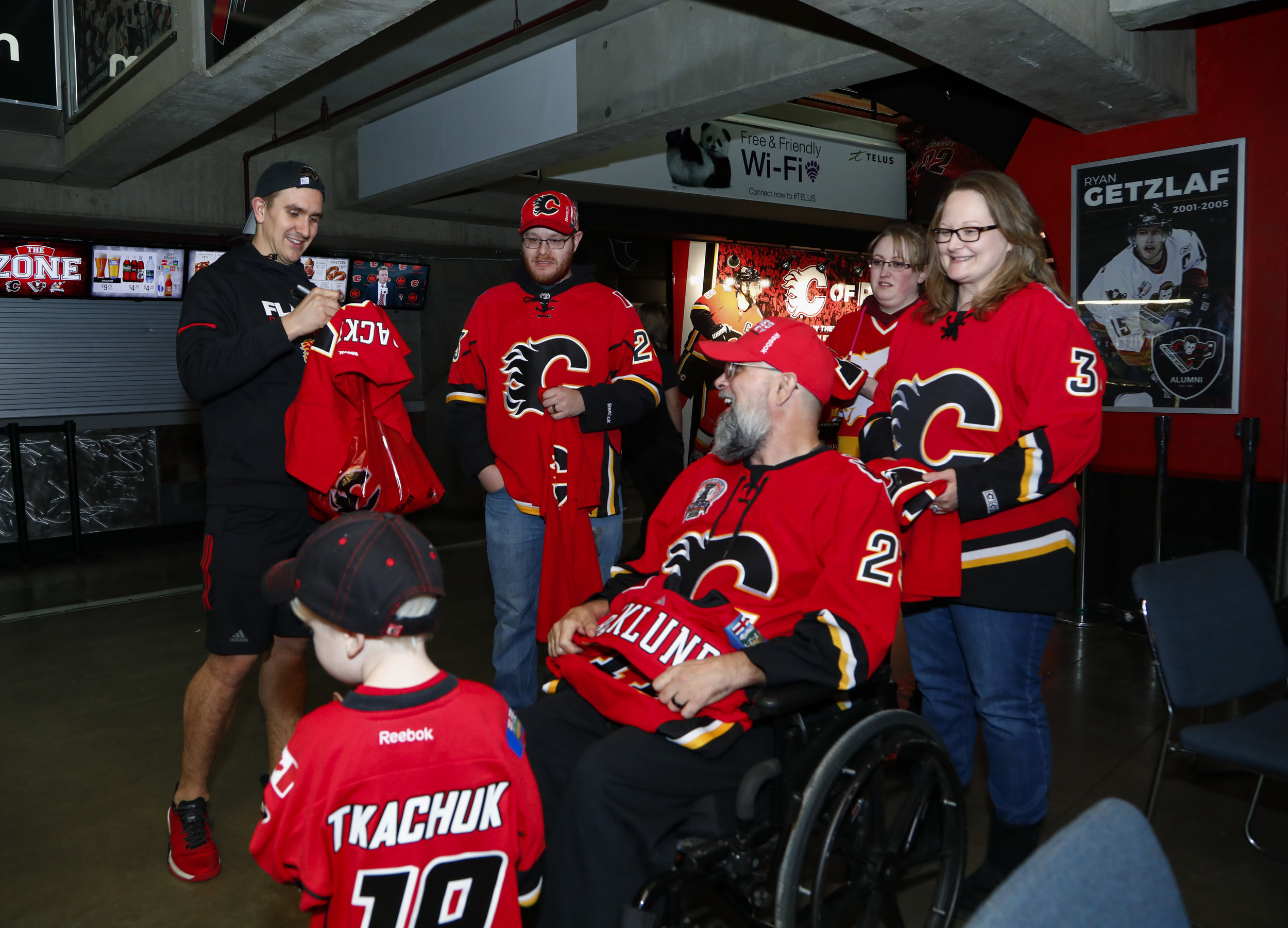
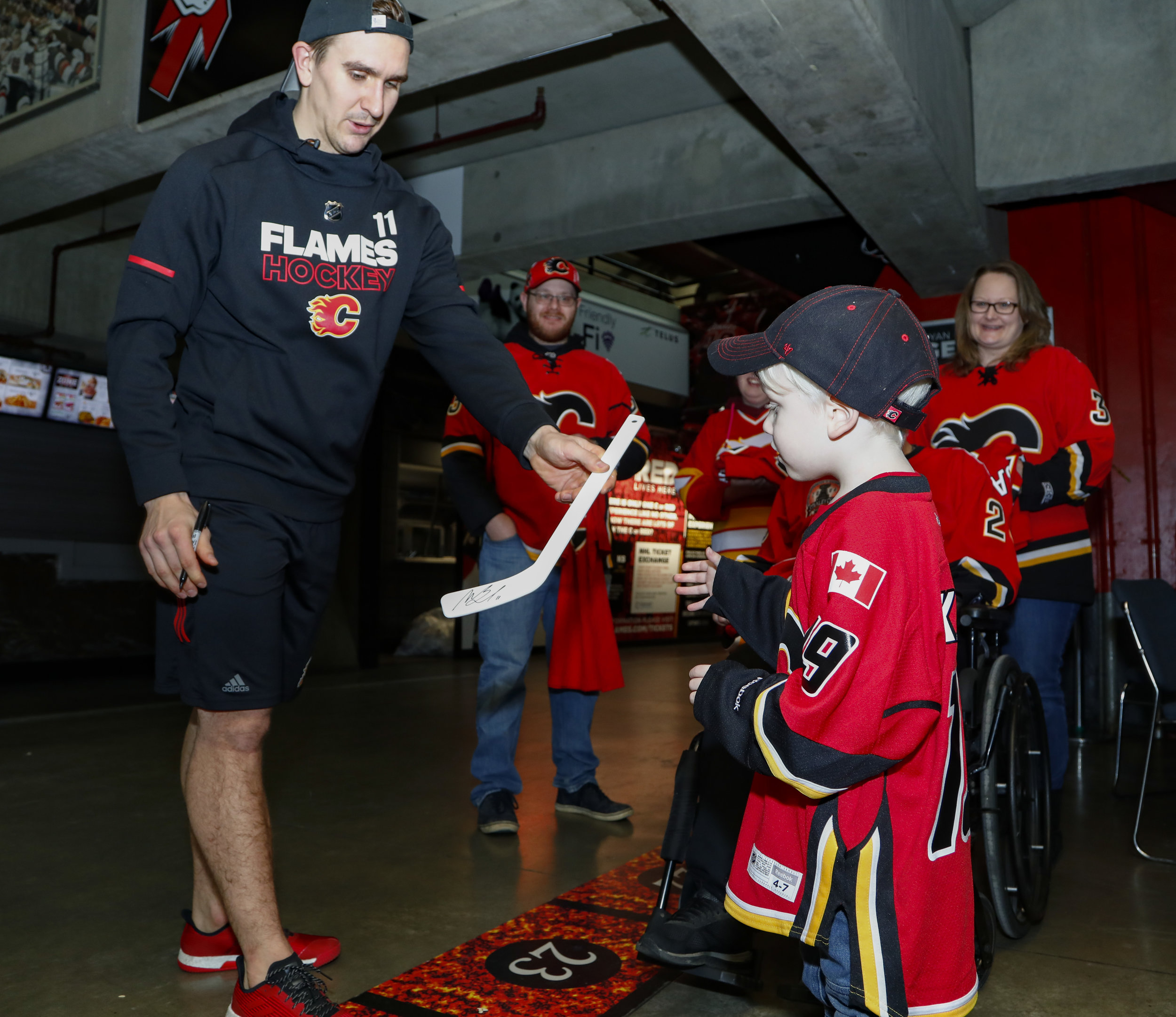
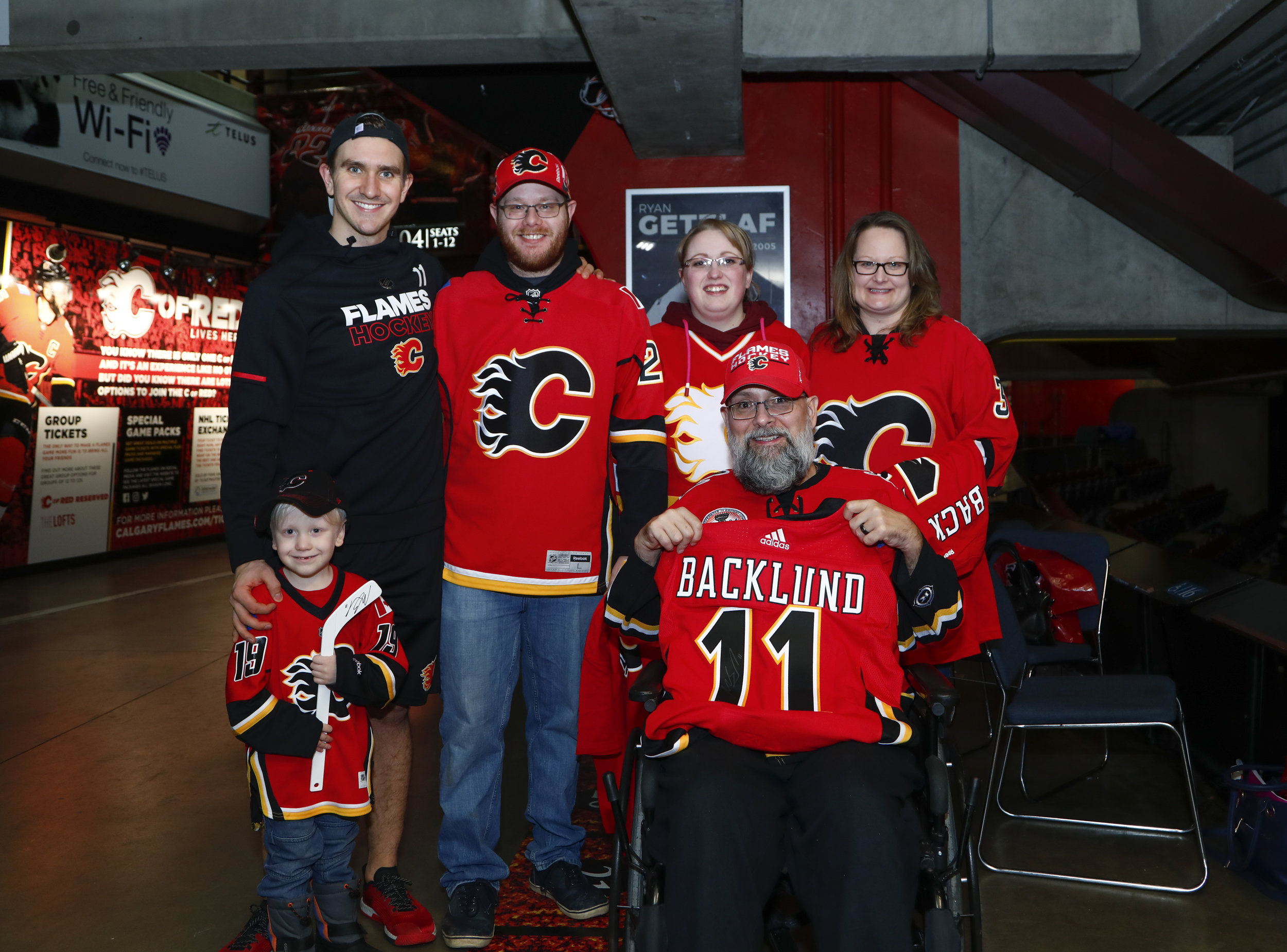
2018 Betty's Run for ALS
ALS Client Services Conference
Building strength, support and capacity across Canada with our client services so we can provide the best possible support for people living with and affected by ALS.
The first-ever client services conference for the ALS Societies across Canada was hosted in Alberta from November 14-16. This three-day conference offered the Societies' client support staff to discuss best practices of ALS support and advocacy while providing an opportunity for self-care and wellness.
Hosted at the Banff Centre, the conference began with a discussion of the different programs and services offered across Canada for people living with and affected by ALS. Staff discussed innovative solutions for client support, and shared the practices of each province. The conference was grateful to have Frida Engstrom present about the support services available in Sweden, and how Canada is leading the charge in support for those affected by the disease.
Self-care and coping strategies were the focus of the second day. Dr. Douglas Cave of the Centre for Practitioner Renewal joined the conference to develop an understanding of coping strategies for those supporting people living with ALS, including both staff and caregivers.
The final day of the conference gave the Societies' an opportunity to refine their advocacy skills and participate in case studies related to the provision of care for those affected by ALS. Open Arms Advocacy joined the conference to discuss advocacy at an individual and community level, including engagement with health and social service organizations, politicians, and government.
The ALS Societies across Canada would like to thank each and every speaker, participant and volunteer that helped make this conference such a success. By bringing Canada's ALS support staff together, opportunities for collaboration and program enhancement can occur to help make a stronger impact in the lives of those affected by this disease.
The Societies are so grateful for the outstanding skill and resilience that its client support staff possess, and are sure that they will continue to empower the ALS community for years to come.
2017 funding competition completes $20 million research partnership with the Brain Canada Foundation following the Ice Bucket Challenge
The results of the 2017 funding competition for Canadian ALS research was announced today. Twelve exciting projects were chosen, including a multi-year study of a promising drug combination, three trainee grants that will help to nurture the next generation of Canadian ALS researchers currently pursuing their PhDs, two projects that will explore how ALS treatments could be delivered through the bloodstream, and an initiative that seeks to understand why the muscles of the eyes are often more resilient to ALS as other muscle groups shut down.
These projects were made possible by the contributions from the ALS Societies across Canada and matching funds by Brain Canada, including the 40 per cent of proceeds dedicated from the WALK for ALS and Betty’s Run for ALS.
The research being funded in 2017 seeks to answer the following questions that will help to move us from greater understanding of ALS to the development of therapies for human use:
• Can adjusting the levels of a “guardian” protein protect a protein that becomes toxic in most cases of ALS? $125,000 awarded to Dr. Marco Prado with collaborators Dr. Martin Duennwald and Dr. Flavio Beraldo, all from Western University
• Can image-guided focused ultrasound technology be used safely in people living with ALS as a means of delivering future treatment? $124,948 awarded to Dr. Lorne Zinman with collaborators Dr. Nir Lipsman, Dr. Kullervo Hynynen, Dr. Sandra Black, Dr. Todd Mainprize, and Dr. Agessandro Abrahao, all from the University of Toronto
• Can microscopic bubbles in our bodies be used to deliver ALS treatments through the bloodstream? $125,000 awarded to Dr. Derrick Gibbings with collaborators Dr. Baptiste Lacoste and Dr. Maxim Berezovski, all from the University of Ottawa
• Could targeting the activity of motor neurons in the spinal cord be a new way to diagnose and treat ALS? $125,000 awarded to Dr. Yves De Koninck, Université Laval
• Could the change in communication processes between motor neurons and the immune cells of the nervous system after an ALS diagnosis help to identify new treatment targets? $124,930 awarded to Dr. Stefano Stifani, McGill University
• Could touchscreen technology help to improve testing for the cognitive impairment that occurs in some cases of ALS? $110,770 awarded to Dr. Flavio Beraldo with collaborators Dr. Marco Prado and Dr. Vania Prado, all from Western University
• Could whole genome sequencing reveal new areas of genetic mutations that make some people more likely to develop ALS? $75,000 awarded to Jay Ross, a PhD student in Dr. Guy Rouleau’s lab at McGill University
• How might misfolded proteins that occur in ALS cause cells to die? $50,000 awarded to Sonja Di Gregorio, a PhD student in Dr. Martin Duennwald’s lab at Western University
• What can we learn from mice that are able to walk almost normally despite significant loss of motor neuron function? $125,000 awarded to Dr. Turgay Akay, Dalhousie University
• Why are eye muscles more resistant to ALS, and what can we learn about this that could help to preserve the function and use of other muscles? $121, 048 awarded to Dr. Richard Robitaille with collaborator Danielle Arbour, both from Université de Montréal
• Will probiotics that improve ALS symptoms in worms also work in mice? $75,000 awarded to Audrey Labarre, a PhD student in Alex Parker’s lab at the Université de Montréal
Support the ALS Society of Alberta through Giving Tuesday
November 28, 2017
We would like to invite you to help us support youth affected by ALS in Alberta.
The Support for Champions program allows children whose parents are affected by ALS to participate in childhood activities that may not be available to them due to the immense financial burden of ALS. The program invites parents or children to apply to the Society for funding for events or activities that the child would like to participate in.
"My son, Owen, received money for his basketball season this year from the Support for Champions program. His father has been living with ALS for the past five years. Owen loves playing basketball, skiing, biking, skateboarding and playing video games. When he is visiting his dad, he makes paper airplanes to hang in his room. He is a creative, active and loving seven-year-old and we thank the Support for Champions program for giving him the opportunity to play basketball this year".
The need for this type of support is real and is currently not being met for many families in Alberta. Many families do not have the financial means and social network to be able to ensure that the children affected by ALS are still able to engage in social activities, deal with their grief and anger appropriately, enjoy childhood despite their parents suffering and look forward to a bright and promising future. For some families there is a real struggle in balancing financial responsibilities and recreational activities, a struggle that the Support for Champions program aims to help.
"I would like to thank you for supporting my mum, to help us purchase my transportation passes for this semester. We appreciate your continuing support." - a Support for Champions recipient.
ALS is a devastating disease with no known cause or cure. Families and caregivers rely on the ALS Society of Alberta to provide hope and support during their journey with the disease. Without the Society’s support, many families would experience a grave financial burden in addition to the emotional burden of the disease. ALS can strike anyone at any time regardless of age, sex or ethnic origin and the average life expectancy after diagnosis is only three to five years.
We appreciate your consideration in helping us to meet our mission of “making each day the best possible day for people living with and affected by ALS.”
Uncorked for ALS
On Friday November 10, the Calgary Flames Foundation hosted Uncorked for ALS, raising awareness and funds for ALS research. The fundraiser was inspired by Mikael Backlund and his fiancee Frida Engstrom, who lost her mom to ALS in Sweden.
We are so fortunate to have the support of the Calgary Flames community. Thank you!
Judy Schweitzer ALS Curl for a Cure


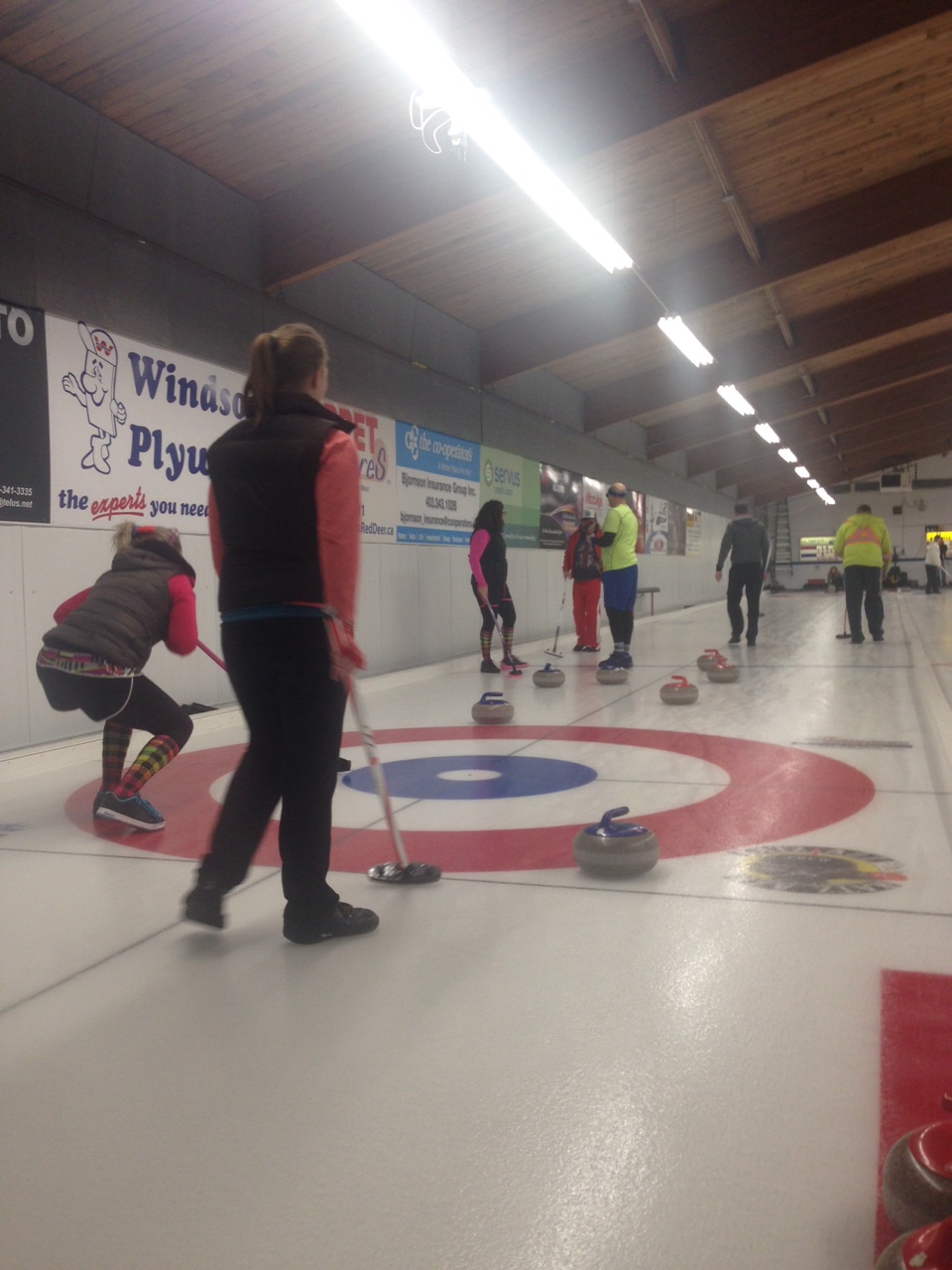
The 8th annual Judy Schweitzer ALS Curl for a Cure took place on Saturday, November 11 in Red Deer! Thank you to Carrie Mello, and all of your family, friends and supporters that help to make this event happen every year!
Thursday night with the Flames!
Thank you Mikael Backlund for making memories and hosting our families at Thursday night’s game!
Go Flames Go!
Thank you Mikael Backlund and Frida Engstrom for hosting a couple of our families at last night's Flames game! It was a night to remember.
